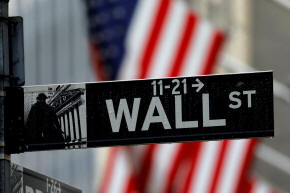Exclusive: Wall Street revives Russian bond trading after U.S. go-ahead
 Send a link to a friend
Send a link to a friend
 [August 15, 2022] By
Davide Barbuscia [August 15, 2022] By
Davide Barbuscia
NEW YORK (Reuters) - Several major Wall
Street banks have begun offering to facilitate trades in Russian debt in
recent days, according to bank documents seen by Reuters, giving
investors another chance to dispose of assets widely seen in the West as
toxic.
Most U.S. and European banks had pulled back from the market in June
after the Treasury Department banned U.S. investors from purchasing any
Russian security as part of economic sanctions to punish Moscow for
invading Ukraine, according to an investor who holds Russian securities
and two banking sources.
Following subsequent guidelines from the Treasury in July that allowed
U.S. holders to wind down their positions, the largest Wall Street firms
have cautiously returned to the market for Russian government and
corporate bonds, according to emails, client notes and other
communications from six banks as well as interviews with the sources.
The banks that are in the market now include JPMorgan Chase & Co, Bank
of America Corp, Citigroup Inc, Deutsche Bank AG, Barclays Plc and
Jefferies Financial Group Inc, the documents show.
The return of the largest Wall Street firms, the details of the trades
they are offering to facilitate and the precautions they are taking to
avoid breaching sanctions are reported here for the first time.

Bank of America, Barclays, Citi and JPMorgan declined to comment.
A Jefferies spokesperson said it was "working within global sanctions
guidelines to facilitate our clients’ needs to navigate this complicated
situation."
A source close to Deutsche Bank said the bank trades bonds for clients
on a request-only and case-by-case basis to further manage down its
Russia risk exposure or that of its non-U.S. clients, but won’t do any
new business outside of these two categories.
STRANDED ASSETS
Some $40 billion of Russian sovereign bonds were outstanding before
Russia began what it calls a "special military operation" in Ukraine in
February. Roughly half was held by foreign funds. Many investors got
stranded with Russian assets, as their value plummeted, buyers
disappeared and sanctions made trading hard.
In May, two U.S. lawmakers asked JPMorgan and Goldman Sachs Group Inc
for information about trades in Russian debt, saying they may undermine
sanctions. The following month the Treasury's Office of Foreign Assets
Control banned U.S. money managers from buying any Russian debt or
stocks in secondary markets, prompting banks to pull back.
Regulators have since taken steps to help ease the pain for investors.
The Treasury provided further guidance on July 22 to help settle default
insurance payments on Russian bonds. It also clarified that banks could
facilitate, clear and settle transactions of Russian securities if this
helped U.S. holders wind down their positions.
Separately, European regulators have also eased rules to allow investors
to deal with Russian assets by allowing them to put them into so-called
side pockets on a case-by-case basis.
[to top of second column] |

Raindrops hang on a sign for Wall Street
outside the New York Stock Exchange in Manhattan in New York City,
New York, U.S., October 26, 2020. REUTERS/Mike Segar

The price of some Russian bonds has jumped alongside the renewed trading
activity since late July. That could make the trades more attractive to
investors and also help companies that sold protection against Russian default.
For example, U.S. bond manager PIMCO - which was on the hook for a payout of
around $1 billion after Russia defaulted on its dollar debt in June - could now
save around $300 million, one investor estimated. PIMCO declined to comment.
"There’s some bid emerging for both local and external bonds for the first time
in a while," said Gabriele Foa, portfolio manager of the Global Credit
Opportunities Fund at Algebris, who follows the market for Russian securities.
"Some banks and brokers are using this bid to facilitate divestment of Russian
positions for investors that want to get out." Reuters could not establish who
was buying the bonds.
Graphic: Russian bonds involved in CDS auction: https://graphics.reuters.com/RUSSIA-BONDS/CDS/byprjyryope/chart.png
LOTS OF RULES
Some banks are offering to trade Russian sovereign and corporate bonds, and some
are offering to facilitate trades in bonds denominated in both roubles and U.S.
dollars, according to the documents and the investor who holds Russian
securities. But they are also demanding additional paperwork from clients and
remain averse to taking on risk.
In a research update to clients on Wednesday, for example, Bank of America
declared in capital letters in red: "Bank of America is now facilitating
divestment of Russian sovereign and select corporate bonds.”
But it added that it would be acting as "riskless principal on client
facilitation trades,” meaning a situation where a dealer buys a bond and
immediately resells it. It also warned there were "a lot of rules around the
process" which remained subject to "protocol and attestation.”
The approaches also differ among banks. In some cases, for example, banks are
offering clients to help divest their holdings as well as other types of trades
that would reduce exposure to Russian assets, while others are limiting trades
to asset disposals only.

At times they are asking investors to sign documents prior to trade execution
that would allow the banks to cancel trades if settlement does not go through
and risks leaving the banks with Russian paper on their books, according to one
of the documents and the investor.
One bank warned clients that settlements would take longer than usual.
(Reporting by Davide Barbuscia in New York; Additional reporting by Rodrigo
Campos.; Editing by Megan Davies, Paritosh Bansal and Edward Tobin)
[© 2022 Thomson Reuters. All rights
reserved.]This material may not be published,
broadcast, rewritten or redistributed.
Thompson Reuters is solely responsible for this content. |